Each school year, you prepare for your autistic child’s next academic year with an Individualized Education Plan (IEP) discussion. This is usually with your child’s special services team, current teacher, the new teacher and even assistant vice principal at your child’s school. To ensure that your child receives all the services and accommodations needed, it’s important to be ready for the discussion. So how can you effectively plan for the IEP discussion for your autistic child?
Understand which type of IEP meeting you are attending
First, you need to know which type of IEP meeting is being held for your child. I have experienced a few types over my son J’s school career. They can include:
- Early start IEP transition meeting – This meeting determines if your child qualifies for an early intervention IEP. You or the school can request this. Many times, this occurs as a child is entering Kindergarten. For my son J, we had this while he was in his final year of preschool. In fact, our school system put an IEP in place while he was still in preschool, and a special services teacher came to his Montessori preschool twice a week to work with him to help better prepare him for Kindergarten and elementary school. Some elementary schools have development preschools that children could attend.
- Initial IEP meeting – This is the first meeting to determine if your child meets the criteria to qualify for an IEP. The team will evaluate the testing results and make recommendations based on those. Don’t agree with their assessment? You can request an independent educational evaluation. There is no cost for parents to request this.
- Annual review meeting – For those of us with kids who have IEPs, this is the meeting we have most frequently. Each year, you meet with the team at your child’s school to discuss your child’s IEP for the rest of the school year and plan for the following year.
- Three-year review meeting – Every three years, the school’s team meets to evaluate the continued need for an IEP. They discuss what the next three years could look like and whether any additional evaluations need to be completed.
Knowing which type of IEP meeting can help you better prepare for the discussion.
Evaluate how your child has done since the last IEP meeting

Before the meeting, take out the current year’s plan and any update reports you’ve received throughout the school year. Determine if the current accommodations have been enough to help your child. Note what is going well and what further assistance you believe your child needs. Write down some notes so that you are prepared to share your thoughts during the meeting.
Check-in on your goals for your child
It’s also good to look at the goals you and/or your child’s therapist(s) have set for your child that year and into the next. Are there goals that an IEP or certain classes at your child’s school could help advance? Write those recommendations down to share at the IEP meeting for your autistic child.
Gather any necessary paperwork
Do you have any supporting documentation that you need to share? Make sure to gather it and bring it with you to the meeting. This could be recommendations from your child’s therapist or doctor or your own research from credible sources on a particular topic.
Remember that you are an essential member of the team

When I read articles about the IEP process, so many times it seems like they are written with an us vs. them perspective. Your child’s special services team and teacher want your child to succeed just like you do. Approach IEP meetings with a partnership attitude. You are there to work together with your child’s school team to ensure you are helping your child to succeed. Yes, you do need to advocate for your child and ensure they are getting the services and accommodations agreed upon. However, it’s most productive if it’s done collaboratively. I have really appreciated how J’s special services team and teachers in his school system have diligently worked to support him over the years.
Read the IEP draft carefully to ensure everything is accurate
After the meeting, your child’s special services teacher should send you the draft IEP. Read it carefully to ensure everything you agreed upon in the meeting is included in the IEP. If something is missing, don’t hesitate to write it in and send the document back to be corrected. I’ve rarely had to correct anything in my son J’s IEP draft; however, we all make mistakes and something may have been left out in error. It’s better to take the time to double check.
Do you have some additional recommendations for how to effectively prepare for an IEP meeting for your autistic child? If so, leave a comment so that we can learn from each other on this journey!








